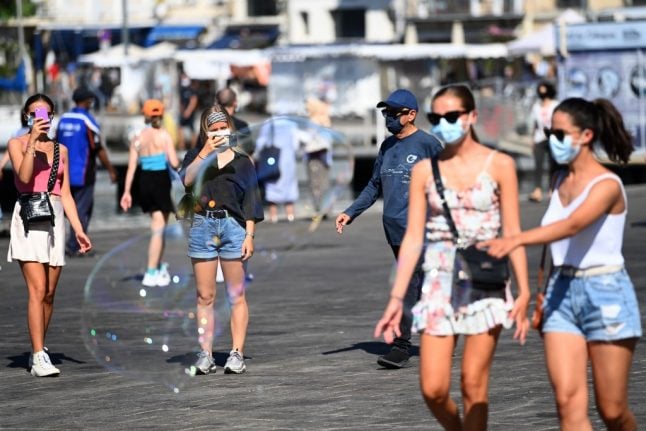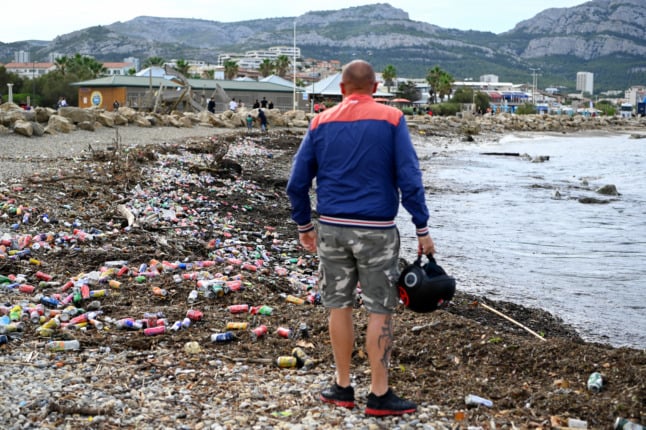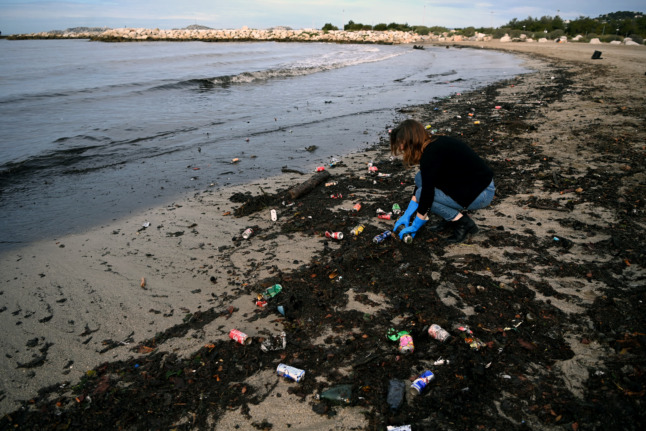The new measures were announced by Christophe Mirmand, head of the Provence-Alpes-Côte d'Azur region, during a press conference on Monday.
“We're living under exceptional circumstances,” Mirmand said, as he laid out the new rules set to help slow down the rising spread of Covid-19 in the region.
#EnDirect de la conférence de presse. @Prefet13 annonce les mesures renforcées dans les #BouchesduRhone pour lutter contre le #Covid_19 en présence de @ARSPaca @prefpolice13 @aphm_actu @marseille ?? pic.twitter.com/isf66CWfWQ
— Préfet de la région PACA et des Bouches-du-Rhône (@Prefet13) September 14, 2020
French Prime Minister Jean Castex on Friday asked regional heads of Bouches-du-Rhône, Nouvelle Aquitaine and in the overseas territory Guadeloupe to present new and stricter measures to limit the rapidly rising spread of the virus in their areas.
The three areas were outlined as those in direst need of restrictive measures to curb the spread and alleviate pressure on the areas' hospitals.
Here's a look at the new rules in the Bouches-du-Rhône département, home to the bustling port-city of Marseille.
Gatherings
Gatherings of more than 10 people on beaches and in green areas such as parks were banned in all towns and cities in the area where the infection rate had surpassed 100 cases per 100,000 inhabitants, meaning local authorities had registered at least 100 new cases per day over the last seven days.
“I do not rule out taking more restrictive measures from 8pm in the evening,” Mirmand said.
Events of more than 1,000 people were also banned in the département, compared to the nationwide limit which is set at 5,000.
Masks
In the 27 towns in Bouche-du-Rhône with the highest infection rate everyone leaving their home between 6am until 2am will need to wear a mask at all times, with the exemption of when in vast open spaces like big parks, the prefect said.
Local authorities would publish the full list of areas soon, he said, and this list would be based on data from the national public health agency Santé Publique France.
In the remaining towns and cities masks must be worn in all crowded public spaces such as markets, outside schools, bus stops and the like, the prefect said, adding to the already-existing nationwide rules making face masks compulsory inside all public spaces and on public transport.
Bars and alcohol
All alcohol consumption in outdoor public spaces after 8pm has been banned across the département.
The annual heritage days events (Journées du Patrimoine) in September was cancelled.
Bars, restaurants and general food shops continue to close at 12.30am, a restrictive measure announced previously in a bid to stem the spread of the virus. Consuming alcohol while standing at bars was now prohibited.
“Checks and sanctions will be ramped up,” Mirmand said, adding that authorities already had issued 52 formal warnings to establishments that had not complied with the rules.
Remote working
The prefect also asked businesses to recommend their employees work from home and warned that authorities would increase the number of checks to see that businesses complied with health rules.
Elderly
Nursing homes for elderly (Ehpad) in the whole département must limit the number of visits to one per day of two visitors maximum.
Mounting pressure on hospitals
Just before the prefect's announcements, regional health director Philippe De Mester reported that the region's hospitals were reaching the limit of their capacities.
“Over the last 10 days or so, we've seen a rapid increase in hospital admissions in Bouches-du-Rhône,” he said.
“Our intensive care units are under very high pressure.”
? “Depuis une dizaine de jours, on voit une augmentation rapide d'admissions dans nos hôpitaux des Bouches-du-Rhône”, poursuit Philippe de Mester. “Nos services de réanimation sont en très forte tension”
Suivez notre direct ?https://t.co/lGjAkdV1XH pic.twitter.com/Y9RArEjxf4
— franceinfo (@franceinfo) September 14, 2020
In total, 139 people were hospitalised in the region's intensive care units, leaving them with a remaining capacity of 64 beds in total.
In Marseille, the situation was even more strained, with 31 out of 35 intensive care beds already occupied and demand still surging. Hospital director Jean-Olivier Arnaud, of the Hôpitaux de Marseille (AP-HM), said they would add 25 supplementary intensive care beds this week.
Repeating the situation in March and April when hospitals and intensive care units in hotspots saw their capacities overwhelmed has been the worst-case scenario French authorities has worked against since they began to ease lockdown mid May.
This is why the government last week put pressure on local authorities in areas such as Marseille to impose stricter health rules to alleviate pressure on their hospitals.
READ ALSO: Why are Bordeaux and Marseille facing tougher Covid-19 restrictions but not Paris




 Please whitelist us to continue reading.
Please whitelist us to continue reading.
Member comments